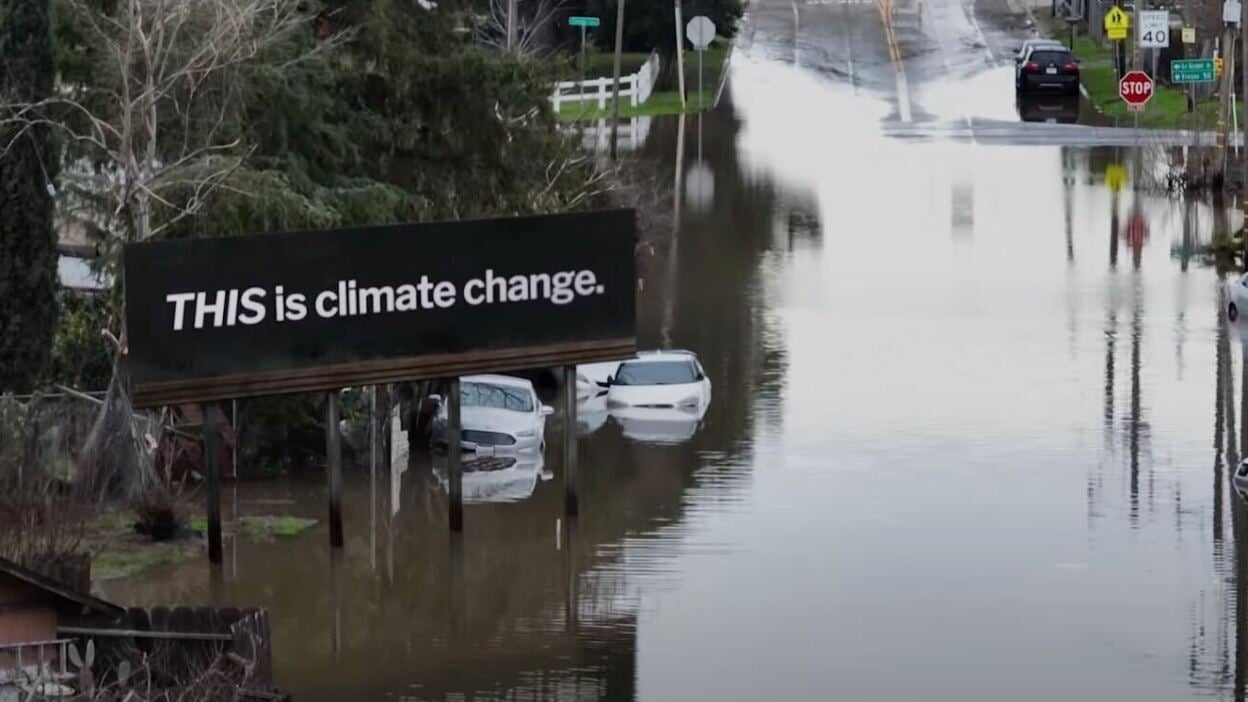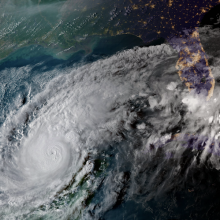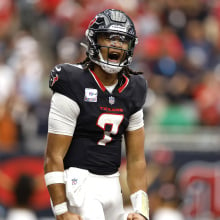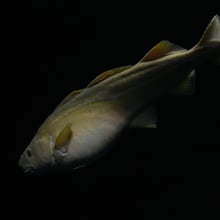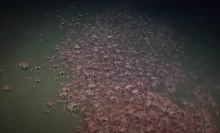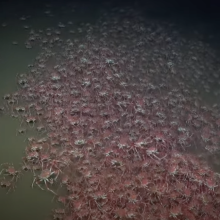What do you do when people aren't taking the climate crisis seriously? You make them part of the problem.
That's the narrative-altering tack taken by Act of Man, a new nonpartisan climate coalition and social activation that's shifting the vocabulary around so-called "natural" disasters to center the increasingly essential role of human climate change in extreme weather — weather that should more accurately be called "unnatural."
Getting real on the state of the climate
The scope and frequency of "unnatural disasters" is convincing enough for the linguistic shift. In 2022, Americans endured the most active year for extreme weather events ever recorded in the U.S. Among drought, wildfire, and winter storm crises, the country fielded nine severe weather events, two tornado outbreaks, three tropical cyclones (hurricanes), and one mass flooding event — these 18 events totaled $165 billion dollars in damage.
This year, as two life-threatening hurricanes touched down on the southeastern United States in the span of just one month, the country has already broken that record. An August report from NOAA's National Centers for Environmental Information details 20 confirmed weather and climate disaster events. Those are just the disasters happening at large scale, each totaling more than $1 billion in damages.
More important than the numbers: Communities from coast to coast are still dealing with the repercussions.
Conspiracy theorists would have you believe that this hurricane season — which has already led to the deaths of more than 200 people and displaced thousands — is the product of political geo-engineering billed as climate solutions. Or, simply, that verified storm images are AI-generated.
That's just wholly incorrect.
But these claims — and climate change denialism at large — dance around a truth: They're right that these are man-made events. They really aren't natural. But not because they're genetically or digitally created to stir political unrest and fear. They’re the product of human-generated, long unchecked emissions and rampant pollution that have led us to an alarming climate breaking point.
They’re not an Act of God. They’re an Act of Man.
Tweet may have been deleted
Centering new generations of climate survivors
Soft-launched in August, the Act of Man initiative has amped up its mission in the wake of Hurricane Helene's touch down. It's a partnership between climate scientist coalition Science Moms, community support network Extreme Weather Survivors, and disaster relief partner All Hands and Hearts that will begin airing advertisements on broadcast television, social media sites like TikTok, digital platforms like YouTube, and even streaming services, asking the general public to join their call to action.
Act of Man puts the state of extreme weather bluntly, using Helene as an example: "What made Hurricane Helene so unnatural? Burning fuels. Record warm waters under parts of Helene’s Gulf track were made at least 400 times more likely as a result of climate change. Meaning it is virtually impossible that Helene would have been as severe in the absence of climate change from fossil fuel pollution."
Natasha Bright, a survivor of a North Carolina flash flood caused by Tropical Storm Fred in 2021, lended her story to the Act of Man campaign. In a short video circulated by the initiative, Bright describes the shock of losing everything, including her "forever home," as she points to flood levels more than a foot above her head.
"I don't think that we ever thought that it would be that extreme. Even those who are prepared can never be fully prepared, because we're dealing with events that are just unprecedented," she told Mashable.
Bright's flooding experience devastated her dreams of permanence and stability. She's since moved farther away from the natural rivers she lived by, gotten involved with local climate groups, and studied up on extreme weather science. In the days leading up to Helene, she was restless, a product of post-flood PTSD she says, prompting her to later reach out to a local resource (the Pigeon Community Multicultural Development Center) to provide immediate support with her Waynesville, North Carolina neighbors.
The 47-year-old mother represents a steadily growing population of climate survivors — which includes displaced individuals often referred to as "climate refugees" — reckoning with shocking weather events. What used to be generational storms are now intergenerational storms, and what used to be worries for our future ancestors are now worries for our living children. Bright's family has been impacted by a multitude of extreme weather events, including surviving the destruction of Hurricane Harvey's path through Texas in 2017.
"When I was growing up, I had never even heard of anybody who had been through a natural disaster, and I lived in southern Florida," she said. "I never knew anyone who lost everything. The fact that it's now two in one family… It says something."
Tweet may have been deleted
Relief workers are caught in an endless sprint
All Hands and Hearts, an international disaster response organization that coordinates volunteer-powered humanitarian aid, is currently on the ground in North Carolina and Florida, participating with local organizations in cleanup and hazardous debris removal. The group has already committed to a year-long presence in the area, and are the recipients of Act of Man's fundraising efforts.
The organization abides by a collaborative, less invasive framework of humanitarian response that focuses on embedded volunteers and community participation. "We respond in communities where local capacity is overwhelmed — the local capacity to sufficiently recover from these events does not exist," Jess Thompson, All Hands and Hearts CEO, explained. "We provide a way for people who want to participate directly in relief efforts to be able to do that safely and effectively."
Current donations to the organization go to the year-long Helene operation, but supporters will soon be able to earmark funds for Hurricane Milton or add to a general hurricane relief fund.
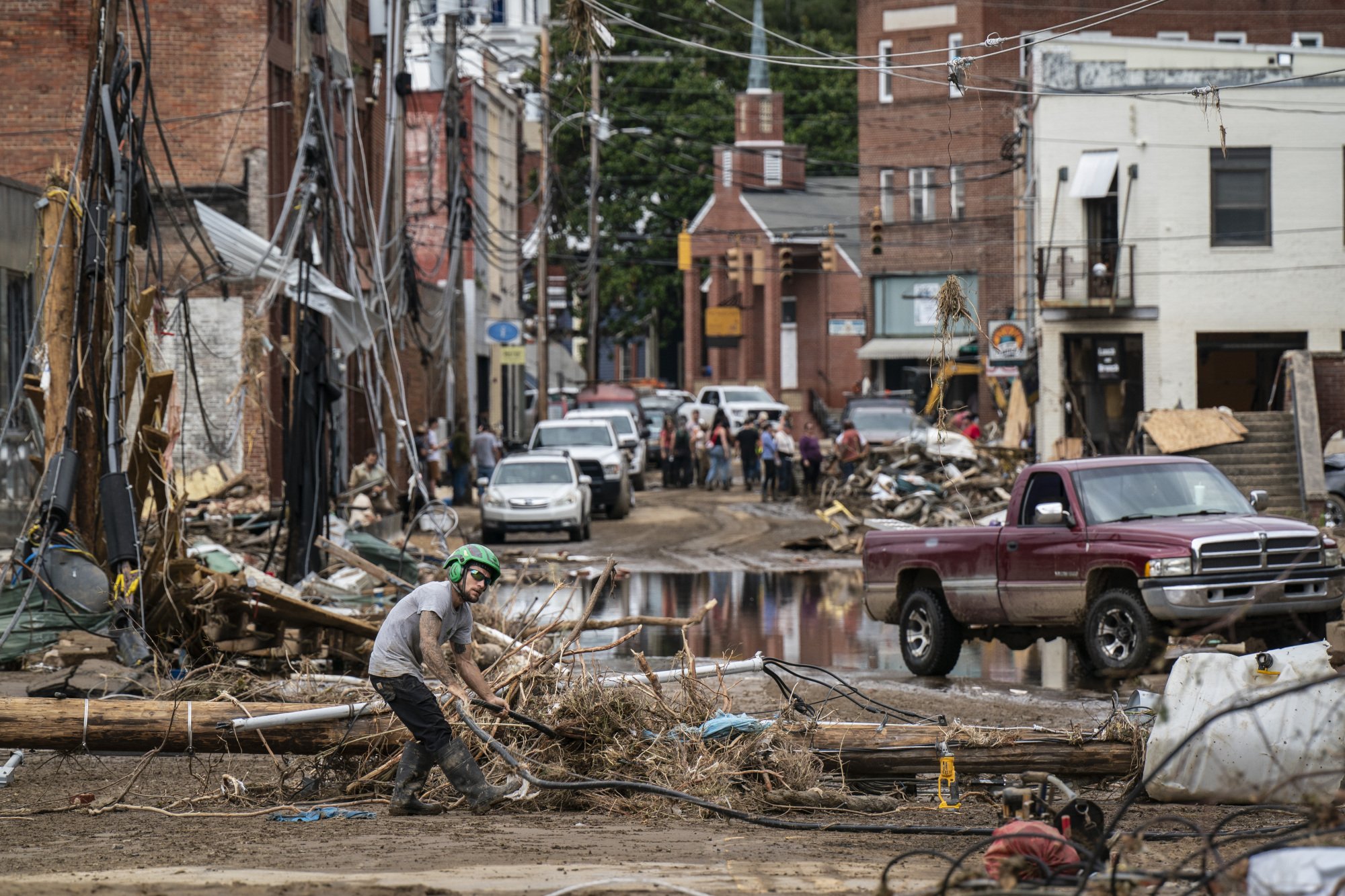
That's because there is an increasing need for long-term humanitarian responses in less predictable areas. "You may have a preconceived notion of people's access to resources in the United States," said Thompson. "But what we find is if you lose everything you own, it hurts. It doesn't matter how much stuff you had before. You are not equipped, alone, to deal with the impacts."
But the intensity of "unnatural disasters" are straining an already complicated and overburdened workforce of relief workers, who are often themselves climate survivors and at risk for more disasters. The organization had been wrapping up a two-year long Hurricane Ian relief effort in Fort Myers Beach, Florida when this season's storms hit. Volunteers, breathless from a series of post-Ian storms, headed out to help with Helene.
"Nobody's had that time to breathe because of Milton coming straight back in," Thompson said. "We are making sure that we're managing our resources, managing our wellbeing, and starting to schedule support resources to make sure that we are at our full potential to be able to support people properly for weeks and weeks and weeks."
Changing the way we discuss climate events
Climate policy advocates, relief workers, and scientists are fatigued in more ways than one, exacerbated by the abstract nature of weather itself.
For context: Floods are the most common disaster in the U.S. Globally, they are becoming more frequent and more severe, as warming atmospheres trap more moisture above our heads. And this deluge, while a threat to all, will have a disproportionate effect on Americans already structurally predisposed to environmental risk. Neighborhoods home to racial minorities and low-income households have the highest inland flood exposures in the South, experts warn. Black communities, specifically, are expected to bear an even greater share of future flood damages.
"What we want to highlight by being part of this coalition is that there is something that we can do about it. It's not theoretical, it's not academic," Thompson said. "There are real people right now suffering from the impacts of these storms."
Dr. Rosimar Rios-Berrios is a Science Moms coalition member and atmospheric scientist at the National Center for Atmospheric Research. In her work, Rios-Berrios researches tropical cyclones, high-impact weather, and precipitation extremes, but she's also a mother worried about her children's future — and how the general public's misunderstandings may impact their urgency to take action.
"There are two sides of me: There is the climate scientist. There is also the mom, the human, the citizen. I have experienced this firsthand," she told Mashable of her upbringing in Puerto Rico. The island is still dealing with the rolling impact of 2017's Hurricane Maria. "There is a big gap that [scientists are] trying to fill, in how we communicate what we know about the climate and what it means to every citizen."
Act of Man represents a digital version of shifts seen across the scientific community. Science communication experts have long studied the power of language and imagery in communicating present danger, especially online, coming to the conclusion that we have to be more direct and urgent to cut through the social media noise. Organizations like the National Hurricane Center have moved toward words like "catastrophic" and "life-threatening," with the tone and timing of messages becoming more crucial. Recent research has found that generic watch and warning visuals shared by official organizations are the least interacted with disaster images online. Overall, communications need to be actionable, and, importantly, relatable.
These changes were seen in the days preceding Milton. Viral videos of police vehicles blaring dire evacuation announcements circulated on TikTok. Clips of Rios-Berrios' colleagues, atmospheric scientists and meteorologists, being moved to tears as they tried to communicate the severity of the storm stirred public interest and alarm. Government leaders were taking to news channels to communicate the life or death stakes.
Tweet may have been deleted
"Individuals, corporations, nonprofits, governments, each have a different part to play in this whole puzzle," said Thompson. The Act of Man campaign suggests that personalized language — phrasing that implicates as much as it warns — is just as important to the future of climate policy and action.
"We know the science, we know the facts," Rios-Barrios added. "Climate change is a human cost. It requires human solutions. And the solutions are out there."
Topics Activism Social Good Social Media
